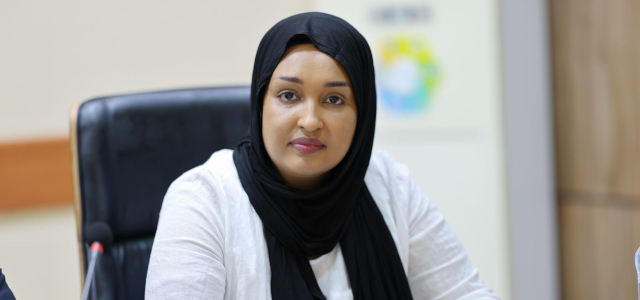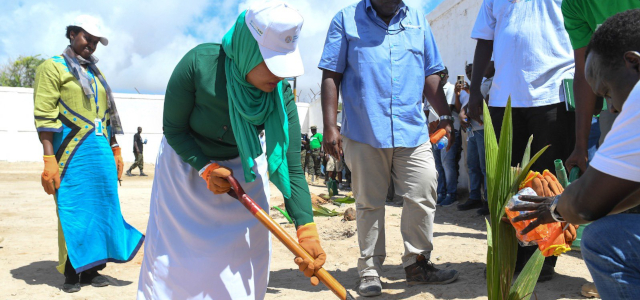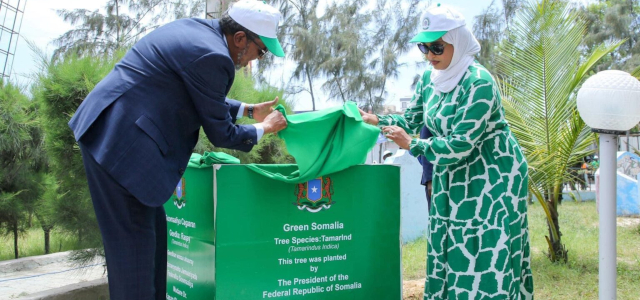The project was successfully implemented under the leadership of the Ministry of Environment & Climate Change with support from the Global Water Partnership as a Delivery Partner.
“The project developed the NDA’s operational procedures and built the technical capacity of the NDA to fulfil its responsibilities. The project also developed an operational manual, no objection procedures for concept notes and proposals, and established a knowledge management platform for the NDA and its resource mobilization strategy. The project enhanced the coordination of the climate finance programme, established an interministerial technical committee, developed a Country Programme for GCF which outlines the needs of the country and how funding from the GCF will be used to address these needs in terms of climate change mitigation and adaptation,” explained Ahmed Yusuf Ahmed, Director General at Somalia's Ministry of Environment & Climate Change.

The Green Climate Fund Somalia Readiness Programme was implemented under the guidance and support of Her Excellency Khadija Mohamed Al Makhzoumi, Minister of Environment and Climate Change
Country Context: Climate Change and Its Impacts
Rising Temperatures: Over the past 50 years, the Greater Horn of Africa region, including Somalia, has experienced significant changes in extreme temperatures. Global data from 1901 to 2005 shows an increase in temperature by 1°C over the century. In Somalia, national data indicates consistently high mean air temperatures throughout the year. With rising temperatures and a marked increase in the number of extremely hot days, Somalia is likely to face greater exposure to severe heatwaves. This shift is projected to lead to a drier, warmer, and more unpredictable climate, which will negatively impact key livelihood sectors such as agriculture, livestock, fisheries, and forestry.
Devastating Droughts: Drought is one of the most frequent and severe natural disaster in Somalia. The country has experienced over 12 major droughts in recent history, with the 2011 drought being the most devastating in 60 years. Over the past two decades, Somalia has endured repeated famines caused by intensifying cyclic droughts, which have worsened poverty across the nation. On average, Somali households lose approximately 40% of their livestock during each drought, severely impacting food security, land quality, and access to water.
The droughts of 2016-2017 and 2021 were particularly catastrophic, resulting in the deaths of 80% of livestock in Jubaland state, affecting 3.4 million people, and displacing more than 380,000. The 2018 Drought Impact Needs Assessment (DINA) estimated the damages at over $3 billion, roughly 50% of Somalia’s GDP, with far-reaching consequences for health, education, and security.
As temperatures continue to rise, it is projected that droughts will become more frequent by 2100, further reducing water availability and placing additional stress on already vulnerable communities.
Increasing Floods: Flooding is another major natural disaster affecting Somalia, with nearly 20 significant flood events occurring in the last three decades. Riverine areas along the Jubba and Shabelle rivers are particularly vulnerable, experiencing regular floods that cause widespread human and economic loss as well as population displacement.
In 2020, the River Shabelle floods devastated the region, displacing all 400,000 inhabitants of Beledweyne town in Hiran and destroying public infrastructure, private homes, and economic lifelines.
Greenhouse Gas Emissions: As a developing country, Somalia’s greenhouse gas (GHG) emissions remain negligible. However, the country is expected to experience economic growth, which could lead to increased emissions. Despite this, Somalia remains committed to remaining a low emitter in the context of sustainable development and poverty reduction, contributing to global efforts to mitigate climate change.
Development of the Country Programme

As one of the most vulnerable countries to climate change, Somalia is intensifying adaptation and mitigation efforts
The center piece of Somalia’s GCF Readiness Project was the development of the Country Programme, a strategic document designed to guide Somalia's engagement with the GCF. Developed through an inclusive consultative process, the Country Programme outlines Somalia's national climate change priorities and presents priority projects and programs that can support Somalia’s efforts to transition to low-carbon climate-resilient development, aligning with Somalia’s climate vision of reducing greenhouse gas (GHG) emissions by 30% by 2030. It also highlights the importance of addressing adaptation measures in key sectors such as agriculture, livestock, fisheries, and water management to mitigate the impacts of climate-related disasters like droughts and floods.
The priorities in the Country Programme are aligned with GCF’s results areas and investment criteria as well as the priorities, goals and targets outlined in Somalia’s National Climate Change Policy 2020, the Nationally Determined Contribution (NDC) (2021) and the National Development Plan – NDP-9 (2020-2024) of Somalia. The Country Programme therefore represents an essential tool at the GCF’s and Somalia’s disposal to achieve transformational impact, while enhancing and ensuring country-driven approaches.
“The process to develop the CP was driven by the NDA and owned by the country. We adopted broad based stakeholder consultations in this process, conducting four national workshops and several bilateral meetings with the private sector, civil society organizations, public sector stakeholders just to mention a few. The Country Programme is a living document that will be periodically updated to reflect new developments, changing national circumstances, and lessons learnt from implementation. The Country Programme will be reviewed annually to assess factors such as relevance, effectiveness and impact. By 2028, Somalia will conduct a comprehensive review and develop a new Country Programme for the next five-year period,” explained Mr. Abdullahi Ali (Najeb), Climate Adaptation Specialist & NDA Secondary Focal Point at Somalia’s Ministry of Environment & Climate Change.
Climate Action Priorities
The Somalia’s GCF Country Programme identifies five priority projects to be developed over2024-2027 for submission to GCF:
- Integrated Flood and Drought Management in the Jubba River
- Enhancing Climate Resilience of Coastal Communities in Hobyo and Kismayo
- Renewable Energy for Rural Areas
- Rural-Urban Transport Infrastructure
- Urban Ecosystem Adaptation
These priorities are focused on supporting the sectors most vital to the country’s economy and the livelihoods of the majority of its population. They also aim to strengthen resilience against the growing impact of climate change on the economy.
Gender Considerations
Climate change, particularly recurrent droughts and floods in Somalia, has worsened the existing vulnerabilities and social marginalization of women, leading to widespread displacement. Women and children account for the majority of those displaced, with 84% of the displaced population being women and children, according to Somalia’s 2018 Drought Impact Needs Assessment (DINA). The water scarcity caused by these droughts has also increased the burden on women and girls, who are the primary water collectors, forcing them to walk longer distances to access water. The most recent 2024 Gu Season (April – June) floods have affected at least 268,000 people, displaced 81,000 people and killed seven children according to the IN Office for the Coordination of Humanitarian Affairs (OCHA) Somalia. Flooding hampers access to nutrition services, as women, who are primary caregivers, face difficulties reaching services due to overflowing rivers, muddy roads, and increased transportation costs.
Considering the gender differentiated impact of climate hazards, the development of the Country Programme (CP) followed a gender-transformative approach, as outlined in the Water, Climate, Development - Gender (WACDEP-G) Programme implemented by the Global Water Partnership (GWP), with primary financial support from the Austrian Development Agency (ADA). The goal of the AIP WACDEP-G programme is to ensure that climate-resilient water infrastructure investments, institutional reforms, and job creation efforts are designed, governed, and managed in ways that strategically advance gender equality.
During the implementation of the GCF Readiness Programme, Somalia conducted a gender analysis. This analysis provided evidence to support the integration of gender-transformative approaches across all activities and outputs of Somalia’s GCF Readiness project, including National Designated Authority (NDA) strengthening, country programming, and pipeline development.
Following this analysis, Somalia developed a Gender and Social Inclusion Action Plan, emphasizing a commitment to promoting low-emission, climate-resilient development through a gender-sensitive lens. A policy brief was also produced to advocate for embedding gender mainstreaming and transformative approaches into climate action in the country.
By integrating gender considerations into climate change interventions, Somalia can create opportunities for women’s economic empowerment, increase their participation in decision-making, and enable them to become active agents in climate adaptation efforts.
Progress and Challenges
Over the past two years, Somalia has made notable progress in improving its institutional capacity to access and manage climate finance. However, significant challenges remain. Somalia lacks nationally accredited Direct Access Entities (DAEs), meaning that it relies heavily on international entities such as development banks, UN agencies and international organisations to access GCF funds. To address this, it was recommended to give priority to the identification of potential national entities, particularly private banks, as candidates for DAE accreditation.
Looking Ahead: Continuous Climate Finance Support
Somalia continues to face climate-related threats, including rising temperatures, severe droughts, and devastating floods, impacting millions of people and displacing large populations. The Country Programme, coupled with ongoing efforts to integrate climate adaptation policies into long-term development goals, will be critical in supporting Somalia’s ambitious climate goals.
Somalia has been announced as one of the 15 African countries that will benefit from $6 million funding under the African Union multi-country GCF Readiness Programme supported by the Global Water Partnership. The overall goal of the project is that all participating countries have strengthened capacities for climate-resilient water investment planning and project preparation to take climate actions.
“Somalia is a country driven with hope, ambition, and determination. While ranked one of the most vulnerable countries in the world in terms of climate change impacts, under the leadership of Her Excellency Khadija Mohamed Al Makhzoumi, Minister of Climate Change, Somalia is mobilizing its rich human resources particularly its youth, harnessing technology, and incentivizing its thriving private sector to invest in the creation of a peaceful, prosperous, and climate resilient state. The Global Water Partnership is proud to partner with the Federal Government of Somalia on this journey, having supported Somalia to establish its first ever adaptation baseline in 2020 as part of its NDC enhancement, and now in 2024, supported development of Somalia’s first GCF Country Programme. We continue to provide tailored assistance to Somalia for the development of a Climate Resilient Water Investment Programme while facilitating peer-to-peer exchange with 15 countries in Africa under the political umbrella of the African Union and with support from the Green Climate Fund,” explained Mr. Alan AtKisson, Global Water Partnership Executive Secretary & CEO.
Conclusion
As Somalia completes the GCF Readiness Programme, the country is better equipped to tackle its climate challenges and pursue low-carbon, climate-resilient development. The roadmap laid out in the GCF Country Programme, combined with Somalia's commitment to securing increased climate finance, represents a significant step towards a sustainable and resilient future for the nation.
